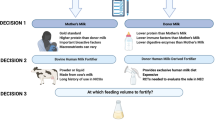Abstract
Objective:
The present study aims to determine the knowledge, attitudes and views of the Muslim religious officers regarding infant feeding, breast milk, wet nursing, milk kinship and human milk banks (HMBs).
Study Design:
A total of 401 religious officers were included in the study. Participants included 355 community service religious officers and 46 faculty religious officers.
Results:
Two hundred fifty-four (63.3%) participants were in favor of administering donor human milk when breast milk is not available from the mothers. To the question ‘What kind of human milk bank would you approve as far as the religious sensitivity is concerned?’ a majority of the religious officers (71.3%) responded that they would only approve if the milk pool contained a restricted HMB where a limited number of recipients were allowed to use the mixtures in these milk pools. Only 7 (1.7%) participants advocated initiating Western-style HMBs in Turkey.
Conclusion:
Turkish religious officers have revealed that they would only approve the establishment of an alternative HMB by a maximum three donors where up to three recipients whose identities are known by one another are allowed to use donor milk from each milk pool.
This is a preview of subscription content, access via your institution
Access options
Subscribe to this journal
Receive 12 print issues and online access
$259.00 per year
only $21.58 per issue
Buy this article
- Purchase on Springer Link
- Instant access to full article PDF
Prices may be subject to local taxes which are calculated during checkout
Similar content being viewed by others
References
Agostoni C, Buonocore G, Carnielli VP, De Curtis M, Darmaun D, Decsi T et al. Enteral nutrient supply for preterm infants: commentary from the European Society of Paediatric Gastroenterology, Hepatology and Nutrition Committee on Nutrition. J Pediatr Gastroenterol Nutr 2010; 50: 85–91.
Aslanoglu S, Ziegler EE, Moro GE . World Association of Perinatal Medicine working group on nutrition. Donor human milk in preterm infant feeding: evidence and recommendations. J Perinat Med 2010; 38: 347–351.
EL-Khuffash A, Unger S . The concept of milk kinship in islam: issues raised when offering preterm infants of muslim families donor human milk. J Hum Lact 2012; 28: 125–127.
WHO/UNICEF. Global strategy for infant and young child feeding, 2003. http://whqlibdoc.who.int/publications/2003/9241562218.pdf (accessed on 3 May 2014).
Gartner LM, Morton J, Lawrence RA, Naylor AJ, O'Hare D, Schanler RJ et al. Breast-feeding and the use of human milk. Pediatrics 2005; 115: 496–506.
Jones F . History of North American donor milk banking: one hundred years of progress. J Hum Lact 2003; 19: 313–318.
Hoobler R . An experiment in the collection of human milk for hospital and dispensary uses [in French]. Arch Pediatr 1914; 31: 171–173.
Pew Forum on Religion & Public Life. Mapping the global muslim population. A report on the size and distribution of the world’s Muslim population, 2009. http://www.pewforum.org/files/2009/10/Muslimpopulation.pdf (accessed on 1 May 2014).
Turkish Statistical Institute. Population census of address based population registration system, 2011. http://tuikapp.tuik.gov.tr/adnksdagitapp/adnks.zul (accessed on 3 May 2014).
Johnston M, Landers S, Noble L, Szucs K, Viehmann L . Breast-feeding and the use of human milk. Pediatrics 2012; 129: 827–841.
World Health Organization. The optimal duration of exclusive breastfeeding: report of an expert consultation, 2011. http://www.who.int/nutrition/publications/optimal_duration_of_exc_bfeeding_report_eng.pdf (accessed on 3 May 2014).
Boland M . Exclusive breast-feeding should continue to 6 months. Paediatr Child Health 2005; 10: 148.
Quigley MA, Henderson G, Anthony MY, McGuire W . Formula milk versus donor breast milk for feeding preterm or low birth weight infants. Cochrane Database Syst Rev 2007; 4: CD002971.
Al-Naqeeb NA, Azab A, Eliwa MS, Mohammed BY . The introduction of breast milk donation in a Muslim country. J Hum Lact 2000; 16: 346–350.
Ghaly M . Milk banks though the lens of Muslim scholars: one text in two contexts. Bioethics 2010; 26: 117–127.
Hsu HT, Fong TV, Hassan NM, Wong HL, Rai JK, Khalid Z . Human milk donation is an alternative to human milk bank. Breastfeed Med 2012; 7: 118–122.
Islamic Fiqh Academy. Resolutions and Recommendations of the Council of the Islamic Fiqh Academy. Resolution No 6(6/2):9-10. 1985–2000. www.scribd.com/doc/19237054/Resolutions-of-the-Council-of-the-Islamic-Fiqh Academy (accessed on 3 May 2014).
Hukum Penubuhan Bank Susu, 2011. http://www.e-fatwa.gov.my/fatwa-kebangsaan/hukum-penubuhan-bank-susu (accessed on 3 May 2014).
European Council for Fatwa and Research. Making Use of Milk from Milk Banks in Western Countries for Muslim Babies. Islamic Cultural Centre of Ireland: Dublin, Ireland, 2004. http://www.onislam.net/english/ask-the-scholar/family/breastfeeding/170656.html.
Acknowledgements
We thank Cathy Beck, senior lecturer from the Department of English, Indiana University, and Purdue University at Indianapolis, IN, USA, for editing this manuscript.
Author information
Authors and Affiliations
Corresponding author
Ethics declarations
Competing interests
The authors declare no conflict of interest.
Rights and permissions
About this article
Cite this article
Ozdemir, R., Ak, M., Karatas, M. et al. Human milk banking and milk kinship: perspectives of religious officers in a Muslim country. J Perinatol 35, 137–141 (2015). https://doi.org/10.1038/jp.2014.177
Received:
Revised:
Accepted:
Published:
Issue Date:
DOI: https://doi.org/10.1038/jp.2014.177
This article is cited by
-
Barriers and Facilitators for the Donation and Acceptance of Human Breast milk: A Scoping Review
Current Nutrition Reports (2023)
-
Attitudes towards human milk banking among native turkish and refugee women residing in a rural region of Turkey: a mixed-methods approach
International Breastfeeding Journal (2022)



